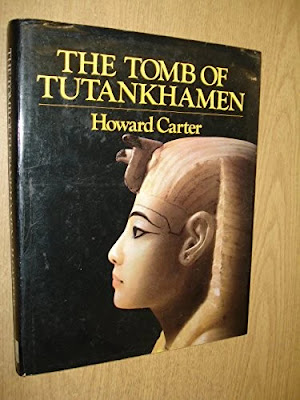I have recently been reading about Tutankhamen, and the discovery of his tomb. I had some interest in ancient Egypt in my early teens. I can't say I ever lost interest in the subject, but I never really followed through on it. So I'm coming back to it after a long time away.
I've been reading The Tomb of Tutankhamen by Howard Carter himself. It's very well written, and reading it has, on several occasions already, greatly excited me.
The most exciting thing about it all, or at least the aspect that raises it all to a pitch of high excitement, is for me the presence of writing.
Without writing, the archeology of ancient Egypt would still be very exciting. (I've used 'exciting' four times in a short space, now. I realize that. It's the exact right word.) Without writing, indeed, the archaeology of ancient Egypt would be enigmatic in a way that has its own poetry.
But the fact that the ancient Egyptians did have writing raises it to a whole other level.
What's especially exciting is that the hieroglyphics, even where they were known, were incomprehensible for fourteen centuries. Nobody in the world knew what they meant, and their meaning was there but not known. Very deep waters indeed.
Irish people like to boast that Newgrange is OLDER THAN THE PYRAMIDS. That's impressive, but the fact that it lacks writing makes it much less interesting than them.
Without wanting to diminish the wonder of modern technology, it seems to me that writing remains the most amazing "technology" of all time. It's awe-inspiring that a set of shapes can convey almost anything from one mind to another, even across centuries. Certainly it never ceases to amaze me.
Almost as impressive as the tomb of Tutankhamun himself is the royal cache where more than fifty royal mummies were found, including Ramesses the Great (Ozymandias, and the Pharaoh of the Exodus). The mummies were moved from their own tombs, and what really gets me is that the priests kept a record of their movements, on linen "dockets" added to their wrapping.
The thought that so many mummies (in the cache and elsewhere) remained unseen and unknown for centuries is something I find spooky. It's hard to explain why.
I didn't set out to write a blog post about ancient Egypt. I wanted to write about unique discoveries, especially unique discoveries involving writing.
We live in a time when knowledge can be shared across the globe in a moment, and a huge amount of it is accessible to anybody anywhere.
But that makes records that are not like this doubly fascinating. For instance, a handwritten manuscript that has not been digitized or copied in any way. I fantasize about being the first person to read one of these. (Well, the first person in a long time, I mean.)
When I was a kid, my home had a big, wooden, cream-painted chest of drawers full of family papers. It was stuffed with all sorts of things, but especially the innumerable writings of my father and grandfather, along with back issues of The Ballymun News, the newspaper/magazine my father edited. I dearly wish I still had those papers. I very often have dreams of going through them again. Sadly, they are long since gone-- God knows where.
There's another dream I've only had once but which has always stuck with me. In this dream, I came across a sort of ditch (or bunker or dug-out)-- a very shallow and muddy hole in the ground, room-sized but with a very low ceiling. Somebody I know was living there (or at least, occupying it) and had become the custodian of a set of papers-- papers which were the only records of an alien civilization. There was nothing high-tech about them. There were just papers, handwritten as far as I can remember, and stuffed into the muddy space. My acquaintance had become totally fixated on them. I don't blame him. I've never fully left that ditch myself.
(Although I don't attach any paranormal or supernatural significance to dreams, I do think that some dreams can be hugely important in revealing the deepest parts of our own soul.)
The incredible archive of cassette recordings found in Jonestown are another example-- especially Q 875, the mysterious tape recorded on the day after the mass suicides.
I've very often felt the desire to write a story based around a collection of unique documents. I've sometimes thought this could take the form of someone going through an archive of diaries, letters etc. left by some commune after its dispersal. (You see why Jonestown came to mind, although I wasn't thinking of mass suicide or anything like that.) The essence of this story would be that the person investigating is alone in the house. The only sounds he hears is the hum of the fridge and the whistling of pipes. The voices from the archive are completely soundless.
Have I communicated the fascination? I hope so.
Ultimately, the most fascinating unique records are the unique records everybody carries around in their memories.




Great post. I love the story idea too - no need to write it, the synopsis is enough.
ReplyDeleteThank you!
DeleteI've often felt, myself, that a story's synopsis was enough!
Yes, I think that is often true. Or how I would say it is that in some stories, the synopsis, the idea, is the core of the story and the story is concretizing that idea.
Delete